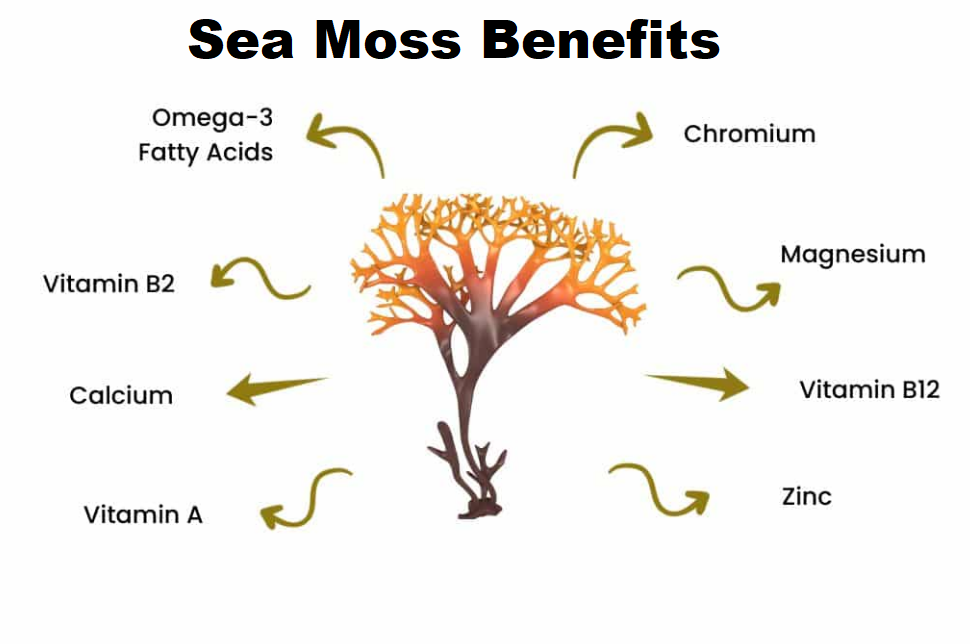Sea moss, also known as Irish moss or red seaweed, is a kind of seaweed that grows year-round in tidepools and inlets.
Sea moss is typically harvested in New England to extract carrageenan, a gelatinous carbohydrate used in baked goods and cosmetics. However, sea moss can also be eaten on its own and is usually used to thicken soups and stews. Let’s have a look at the health benefits of this intertidal seaweed.
Table of Contents
What is sea moss?
Chondrus crispus is an edible seaweed found growing in coastal areas of the Atlantic, including those in Europe and North America. Like other seaweeds, it’s a rich source of many harder-to-get nutrients.
More commonly known as sea moss, its main culinary use is as the thickening agent, carrageenan. Vegan-friendly and a good all-round emulsifier, carrageenan is often used by food manufacturers. In a domestic setting, however, it’s more possible to find sea moss in supplement form rather than as a recipe ingredient.
Given its name, you might wish sea moss to be green. However, it’s actually available in a variety of colors from green through to yellow, red, brown, and even black. The most common variety, however, is red and is referred to as Irish moss.

Nutritional benefits
Two tablespoons (10g) of Irish moss (raw) has approximately:
4.9 kcals/21 KJ
0.15g protein
0.02g fat
1.23g carbohydrates
0.13g fibre
7.2 mg calcium
0.89 mg iron
14.4 mg magnesium
0.19 mg zinc
It’s worth noting that nutritional weights will vary depending on the geographical location of the sea moss, the season of the harvest, and how it’s stored and processed.
Top 5 health benefits of sea moss
May support thyroid health
Our thyroid gland is accountable for releasing hormones to help govern our growth, energy, reproduction, and repair. In demand to do this, the thyroid needs a number of nutrients, one of which is iodine and another amino acid, tyrosine. Both of these nutrients are found in seaweed, although in variable levels relying on the variety and how it’s stored and prepared.
May support gut health
Seaweed is rich in dietary fiber, much of which is in the state of polysaccharides. This is a fibre we can’t outline but the bacteria in our gut can – in this way it acts as a prebiotic or food source for these beneficial gut microbes.
Fuelling the gut bacteria in this manner helps create a favorable environment promoting the microbes which offer us the greatest benefits. It’s these gut bacteria that, among other things, help shape our health through their production of useful compounds called short-chain fatty acids.
May support immunity
The harsh circumstances of the coastal waters in which seaweed, like sea moss, have evolved to survive have meant they’ve developed an enviable defense mechanism. As such, they are rich in phytochemicals which, when ingested, provide health benefits including immune modulation and improved immune response for the consumer.
May improve blood sugar control
Studies suggest that having seaweed as part of a healthy, balanced diet may support blood sugar management and potentially reduce the risk of type 2 diabetes. This is thanks, partly, to compounds like carotenoid and fucoxanthin, which help to reduce insulin resistance and support better blood sugar control. The high fibre content in seaweed also plays its part in slowing down the speed of digestion.
May support heart health
Seaweed, including sea moss, is one of the best plant sources of omega-3 fatty acids, which are important for health, and especially so for the heart and cardiovascular system. Studies suggest that seaweed may improve cholesterol balance and act as a blood thinner, decreasing the risk of heart disease.
It’s worth noting that although some studies investigate the effects of sea moss, many use alternative species of seaweed. Therefore, more research is needed to clarify our understanding of the typical health effects of sea moss in the human diet.
Is sea moss safe for everyone?
Being rich in the mineral iodine, seaweed, including sea moss, is particularly useful for those following a largely plant-based diet. However, while the iodine content makes seaweed useful for thyroid health, consuming too much may have a detrimental effect. For this reason, the British Dietetic Association recommends seaweed is not be eaten more than once a week, especially during pregnancy.
If you’re on blood-thinning medication such as warfarin, your GP or dietitian may suggest you monitor the vitamin K-rich foods, like seaweed, in your diet to ensure you eat similar amounts consistently. Another nutrient that seaweed is high in is potassium. Certain medications function by raising the potassium levels in the blood. Therefore, if you are taking one of these, you should be cautious when eating foods rich in potassium, like seaweed.
Seaweed can absorb and store minerals in high amounts and may accumulate toxic heavy metals such as cadmium, mercury, aluminum, and lead. That said, one study suggests the toxicity risk seems low, although it is best to consume sea moss, as with other sea vegetables, in moderation.
